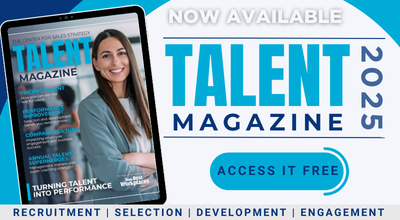
Candidates are in and out of the job market quickly, particularly those with superstar talent. If you’ve adopted a “we’re always hiring” mentality to help you build and fill your talent bank, you’re likely conducting interviews more frequently.
According to LinkedIn, 83% of talent say a negative interview experience can change their mind about a role or company they once liked.
Selection is a two-way street. You’re interviewing the candidate, and at the same time, the candidate is interviewing your company. It’s important to maximize your opportunity to interview candidates while giving them a solid understanding of the job role and your company culture.
This is easier said than done! Don’t try to tackle it on your own. Instead, utilize your resources to create a positive interview process for all parties involved.
1. Talents are Innate
Start with a validated talent assessment to help you distinguish top performers from the rest. In an interview, it can be easy to take off your sunglasses and be blinded by a candidate’s impressive resume or captivating personality. Unlike skills – which can be taught, and experience – which occurs over time, talents are innate.
If your candidate doesn’t have talents that align with your open position, it’s time to say goodbye. Ideally, ask the candidate to take the talent assessment before meeting with them. You’ll avoid being blinded and save yourself, and the candidate, precious time.
2. Great Minds Think Differently
Diversity of thought is extremely beneficial throughout the workplace, so why exclude it from the hiring process?
Invite a small group of people from various roles within the company to join your interview. Each person you invite to the interview will likely have a different takeaway. One may comment on the candidate’s outgoing and persuasive personality, while another may feel the candidate’s personality was too pushy and overbearing. Diverse opinions will help you make an educated hiring decision.
It's important to remember that adding additional people around the interview table may add additional pressure on the candidate. Your candidate's experience may not be as genuine if the candidate is nervous and uncomfortable.
Consider moving your interview to a non-traditional setting that invites conversation – such as a restaurant or coffee shop. If you aren’t able to host an in-person interview, find a space in your building that conveys a relaxing setting. Take the time to silence notifications and minimize distractions, so you can give your candidate 100% focus.
3. Audition for the Role
It’s hard to fully understand someone’s fit for the role if they don’t properly audition for the part. One of the most effective ways to understand a candidate’s fit is to observe them in a “day in the life” of their prospective position.
Invite your candidate to spend a day in the office working in your actual environment. Be sure to plan their day out well in advance and share how you plan to compensate them for their time. Maximize this opportunity by including a time for them to connect with one or two of the people they will work closely with every day. These team members will have additional insight for you and will likely appreciate your inclusivity during the hiring process.
4. Prepare a Project
Providing your candidate with a project is another way to gather an accurate measurement of their skills. Prepare them for the project by specifying an outline, your expectations, and a deadline. It may also be helpful to let them know the approximate amount of time it should take to complete the project.
When they present or submit their project, devote time to evaluating it. Ask yourself if they finished on time, followed the rules, used well-thought-out research, and showed creativity. What you see, your clients will see. If you notice haphazard organization and poor quality, this will likely extend to your clientele.
5. Circle Back to Culture
If you’ve ever left a red sock in your load of white laundry, you know the impact one item can have on everything around it. Keep this analogy in mind when thinking about your candidate and how they may fit in with your company culture. Every person you hire is either going to add to your culture or detract from it. The more thorough your interview process, the better the opportunity to understand the type of impact your candidate will have.
A new hire is a big commitment to your team, and a new job is a big commitment to your candidate. When we think of interviewing and selection, keep in mind that it travels both directions. Identify which interview methods work best for your team and for your candidates, so you can find the right fit!
*This article was originally published in the 2022 Talent Magazine.





